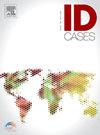Pyopericardium progressing to cardiac tamponade in a patient with dengue fever
IF 1.1
Q4 INFECTIOUS DISEASES
引用次数: 0
Abstract
Pyopericardium is a rare cause of cardiac tamponade. We present a case of a dengue fever patient who presented with cellulitis of the upper limbs, later manifesting cardiac tamponade, which was fatal. Although echocardiography on admission revealed a small pericardial effusion only, it later manifested as tamponade, causing cardiogenic shock. Staphylococcus pyopericardium was found later. Early identification could be possible with bedside point-of-care ultrasonography and echocardiography. Emergent pericardiocentesis or pig tail drain placement is life saving.
一名登革热患者由心包积液发展为心脏填塞
化脓性心包炎是导致心脏填塞的罕见原因。我们报告了一例登革热病人的病例,该患者出现上肢蜂窝织炎,后来表现为心脏填塞,最终死亡。虽然入院时超声心动图显示仅有少量心包积液,但后来表现为心肌填塞,导致心源性休克。后来发现了化脓性心包葡萄球菌。床旁护理点超声波检查和超声心动图检查可以及早发现。紧急心包穿刺或放置猪尾引流管可挽救生命。
本文章由计算机程序翻译,如有差异,请以英文原文为准。
求助全文
约1分钟内获得全文
求助全文

 求助内容:
求助内容: 应助结果提醒方式:
应助结果提醒方式:


